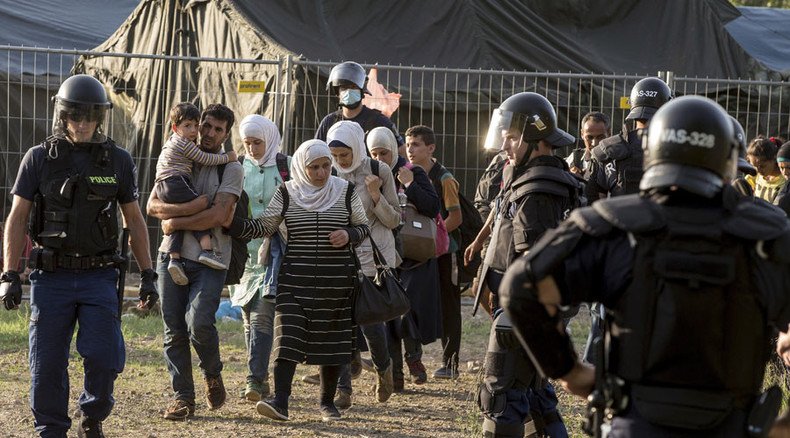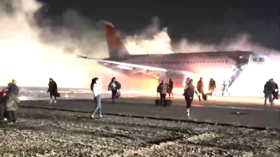'Lucrative' business of people smuggling thriving amid Europe's refugee crisis – report

As refugees continue to pour into Europe each day, smuggling networks are thriving. Traffickers are advertising their services on social media, cashing in huge sums to transport vulnerable souls to the shores of Europe.
Taking advantage of a desperate situation, smugglers offer their help to those fleeing war and persecution – at a significant cost, a report by The Washington Post reveals.
With a “package” to satisfy most price points, traffickers are offering refugees increasingly complex options, Patrik Engström, head of the Swedish national police's national border policing section, told the paper.
Egyptian mogul wants to buy Mediterranean island to house #refugeeshttp://t.co/Exz1l3cMr9pic.twitter.com/2iNvbVGaWg
— RT (@RT_com) September 4, 2015Those options range from a simple RV journey over a bridge to a plane that will fly refugees directly from Turkey to Sweden – a luxury that will set them back about US$10,000.
“As a global criminal enterprise, it is very lucrative,” said Engström, who has monitored human smuggling and trafficking for years.
Those with less money often pay hundreds of dollars for a cramped, below-deck journey across the Mediterranean or thousands more for complex journeys, according to law enforcement officials.
With thousands of refugees leaving their homeland each day, smugglers are highly sought-after. Officials say that traffickers are almost always involved in at least part of a person's journey to Europe, with those journeys completed by boat, foot, rail, and bus.
The high demand for smugglers has, unsurprisingly, led to a boom in the "industry," which European officials believe runs in the billions of dollars.
German theater revives tragedy of 71 migrants found dead in Austrian truck http://t.co/FWQoioSjWepic.twitter.com/0aapQsLUHu
— RT (@RT_com) September 3, 2015Traffickers often advertise their services on social media, making it easy for refugees to make contact – and smugglers in Syria seem to be leading the pack, according to Tuesday Reitano, head of the Global Initiative Against Transnational Organized Crime.
“The Syrians are managing their trips in a much more savvy way than any other group that we’ve seen in the history of migration, that I’m aware of,” Reitano said.
But Izabella Cooper, a spokeswoman for EU border policing agency Frontex, says those in Turkey are just as “media-savvy” and organized as their Syrian counterparts.
However, smugglers aren't the only ones using modern technology to their advantage. Refugees themselves communicate with one another along the journey, using tools such as WhatsApp to warn others about locations with heavy police coverage.
Authorities struggle to keep up
As Europe continues to face the world's worst refugee crisis since World War II, European authorities are being faced with unprecedented circumstances – and are struggling to keep up.
While the number of refugees continues to grow, so does the number of illegal activities, according to Robert Črepinko, head of the organized crime unit at Europol.
URGENT: #Hungary to set up transit zones near border, raise punishment for illegal crossing http://t.co/yT5no7WWwNpic.twitter.com/xoNwI1qkHN
— RT (@RT_com) September 4, 2015“The number of criminal activities is growing with the same speed as the number of illegal migrants,” he said, adding that many traffickers used to smuggle illegal drugs, but have shifted their focus since the crisis began.
Dealing with the crisis in its own controversial way, Hungary has erected a massive razor-wire fence along its border with Serbia – but experts say this will merely increase the use of smugglers.
Not everyone makes it
Refugees are typically required to pay smugglers for each leg of their journey in advance – and after that exchange, traffickers rarely have any motivation to ensure a safe trip for their “clients.”
That has devastating effects for refugees, with many dying while trying to make their way to Europe.
One of the countless cases took place on Wednesday, when the body of a young boy washed ashore in Turkey. The young child, his brother, and mother were three of 12 Syrians who died when their boats sank en route to Greece.
Gruesome photo of drowned toddler’s body on Turkey beach fuels refugee debate (GRAPHIC) http://t.co/ksfgsTtlPjpic.twitter.com/UbpJUOdp9Z
— RT (@RT_com) September 3, 2015Four smugglers have been arrested in connection with the tragedy, according to Turkey's state-run news agency Anadolu.
Just one week ago, the bodies of 71 people were found in an abandoned truck on an Austrian highway. Four people, including the driver, were arrested on suspicion of people smuggling. One of the men had been sought by German authorities one month prior, in connection with a separate trafficking incident.
But those two cases, along with countless stories of capsized boats in the Mediterranean, don't even begin to account for the huge number of tragedies happening every day, Engström said.
Refugees are continuing to enter the continent by the thousands each day, seeking to reach Europe's borderless Schengen zone. Sweden, along with Germany, is one of the most sought-after nations, after Stockholm announced that asylum seekers would be given permanent residency in the country.
LISTEN MORE:












